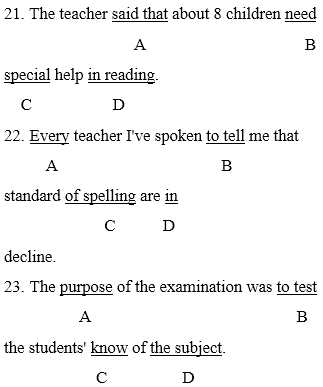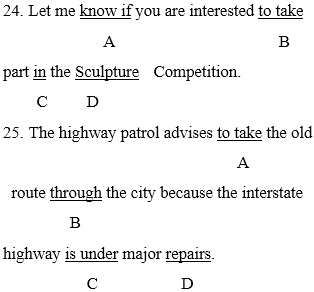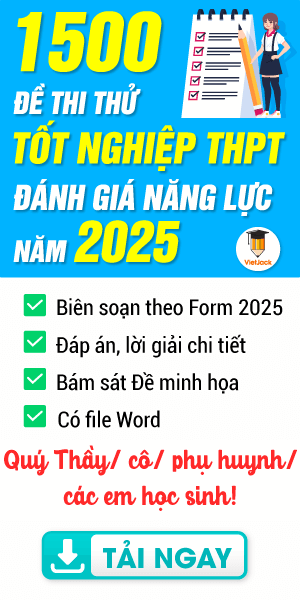Bài tập Tiếng Anh 11 Unit 6: Competitions
Unit 6: Competitions
Bài tập Tiếng Anh 11 Unit 6: Competitions
I. Choose the word whose underlined part is pronounced differently from that of the others:
1. a. twice b. twin c. twinkle d. twist
2. a. drag b. draft c. dramatist d. drank
3. a. dread b. treasure c. treatment d. dreamt
4. a. truck b. trumpet c. truthful d. trustful
5. a. dressing b. trend c. twenty d. frequent
II. Choose the word or phrase - a, b, c, or d - that best completes the sentence or substitutes for the underlined word or phrase:
6. The contest aimed to stimulate the spirit of learning Chemistry ______ students.
a. on b. for c. of d. among
7. The teacher explained the competition's rules ______ the students very carefully.
a. to b. with c. for d. about
8. Most students are interested ______ the annual English Speaking Contests.
a. on b. in c. with d. at
9. ______ is someone who takes part in sports competitions.
a. Judgement b. Sportman
c. Athlete d. Sponsor
10. They quickly read the questions and tried to find out the answers.
a. complete b. guess
c. offer d. discover
11. A string of defeats has failed to break the team's ______.
a. spirits b. efforts
c. works d. methods
12. There is now intense ______ between universities to attract students.
a. competence b. competition
c. competitive d. competitor
13. Such questions provide a useful means of ______ students' interest.
a. expressing b. encouraging
c. stimulating d. providing
14. All students can take part in the annual English-speaking Contest.
a. happening once a year b. happening once a term
c. happening once a month d. happening once every six months
15. He______ his story in front of the whole school.
a. dedicated b. recited
c. said d. delivered
16. My teachers always encourage _______ hard at school.
a. to work b. us to work
c. working d. that we work
17. Eight months after the accident, she still has difficulty _______.
a. to walk b. walking
c. walked d. to walking
18. I really hate _______ away from home so much.
a. you have to be b. you having to be
c. your have to be d. your having to be
19. Staff say that the new computer system _______ to greater levels of stress in their work.
a. led b. would lead
c. has led d. had led
20. He apologized _______ able to finish the project on time.
a. his colleagues not being b. his colleagues for not being
c. his colleagues not to be d. to his colleagues for not being
III. Identify the one underlined word or phrase - A, B, C or D- that must be changed for the sentence to be correct:


IV. Complete the sentences with the correct form of the word in brackets:
26. The company has decided to withdraw from some of its ___________. (sponsor)
27. The playgroup provides plenty of ______________ for the children. (stimulate)
28. Over 25,000 _____________ will run in the Paris marathon. (compete)
29. The negotiation was attended by ____________ of several states. (represent)
30. The scheme aims to encourage increased __________ in sporting activities. (participate)
V. Read the passage carefully, then choose the correct answers.
THE OLYMPIC GAMES
During the Olympic games, people from all over the world come together in peace and friendship. Some of these people compete for medals. Several million people attend the games, and millions of other people watch them on television.
Why do we have the Olympic games? How did they begin? The first Olympic Games that we have records of were in Greece in 776 B.C. The games lasted one day. The only event in the first thirteen Olympic Games was a race. Men ran the length of the stadium (about 192 meters). Then, longer running races were added. Through the years, a few other kinds of events, like the long jump, were also added. During this time, the games were for men only, and women could not even watch them. In the year 393, a Roman emperor ended the Olympic Games because the quality of the games became very low. The Olympics did not take place again for 1500 years!
In 1894, Pierre de Courbertin of France helped form the International Olympic Committee, and the modern Olympic Games began. In 1896 the games were held again in Athens, Greece. The Greeks built a new stadium for the competition. Three hundred and eleven athletes from thirteen countries competed in many events. The winners became national heroes.
After 1896, the games were held every four years during the summer in different cities around the world. In 1900, the Olympics were in Paris, France, and women competed for the first time. In 1908, in London, England, the first gold medals were given to winning athletes. Before that time, the winners received only silver and bronze medals.
The Olympic flag was first introduced in 1920 in Antwerp, Belgium. The flag has five rings on it. The rings represent the continents of Africa, Asia, Australia, Europe, and North and South America. Each ring is a different colorblue, yellow, black, green, or red - because the flag of each of the countries that compete in the games has at least one of these colors in it.
The Olympic Winter Games began in 1924 in Chamois, France. Athletes competed in winter events such as skiing, ice skating, and ice hockey. Today, the Winter Games take place every four years. The Summer Games also take place every four years, but not in the same year as the winter events. Both the Summer Games and the Winter Games must have at least fifteen events, and they cannot last more than sixteen days.
Until recently, Olympic competitors could not be professional athletes. All of the athletes in the Olympic Games were amateurs. Today, however, many of the Olympic athletes are professionals who play their sports for money during the year. Some people disagree with this idea. They believe that the Olympic Games are for amateur athletes, not paid professionals. Other people think that anyone can play in the Olympic Games. No matter who the athletes are, millions of people throughout the world enjoy watching the greatest athletic competitions, the Summer games and the Winter Games of the Olympics.
31. Which of the following is not true of the first 13 Olympic Games in Greece?
a. They lasted only one day.
b. The men competed while the women watched.
c. They consisted of only one event, which was race running.
d. They were for men only.
32. Pierre de Coubertin _____________.
a. was the first athlete from France to take part in the modern Olympic Games
b. helped the Greeks build a new stadium for the modern Games.
c. helped to revive the Games.
d. became a national hero of France.
33. The International Olympic Committee was set up _____________.
a. with Pierre de Coubertin as chairman
b. according the wish of a Roman emperor
c. every four years starting from 1894
d. two years before the modern Olympic Games were held
34. Professional athletes _____________.
a. joined the Olympic Games only recently .
b. have been allowed to compete in the Games since the Olympic flag was introduced
c. get paid for taking part in the Olympic Games
d. have won more gold medals than amateurs have
35. According to the passage, _____________.
a. the participation of professionals has made the Olympic Games less enjoyable
b. no matter who athletes are, the games are, still great to watch for millions of people
c. professional athletes will soon be banned from the Games
d. everyone is opposed to allowing professionals to take part
VI. Choose the answer - a, b, c, or d - that best reports what was said.
36. 'You're always making terrible mistakes.' , said the teacher.
a. The teacher complained about her students making terrible mistakes.
b. The teacher asked her students why they always made terrible mistakes.
c. The teacher realized that her students always made terrible mistakes.
d. The teacher made her students not always make terrible mistakes.
37. Each of you may have one piece of candy,’ Ms. Hoa said to the children.
a. Ms. Hoa advised the children to have one piece of candy.
b. Ms. Hoa asked each of the children to have one piece of candy.
c. Ms. Hoa allowed each of the children to have one piece of candy.
d. Ms. Hoa reminded the children to have one piece of candy.
38. 'Would you mind if I brought a friend to the party?' said Paul.
a. Paul wanted me to bring my friend to his party.
b. Paul encouraged me to bring my friend to the party.
c. Paul asked for permission to bring his friend to the party.
d. Paul promised to bring a friend to the party.
39. “Don't be so disappointed Jeanne. You can take the driving test again.”, said Harry.
a. Harry told Jeanne not to be disappointed and take the driving test again.
b. Harry asked Jeanne not to be disappointed and offered her another driving test.
c. Harry warned Jeanne not to be disappointed' in order to take the driving test again.
d. Harry encouraged Jeanne to take the driving test again.
40. “Let's break for lunch.”, said Mathieu.
a. Mathieu wanted to break for lunch.
b. Mathieu insisted on breaking for lunch.
c. Mathieu suggested breaking for lunch.
d. Mathieu offered us a break for lunch.
Đáp án
| Câu | Hướng dẫn | Câu | Hướng dẫn |
|---|---|---|---|
| 1. a | /aɪ/, còn lại: /ɪ/ | 21. D | in reading → with reading |
| 2. b | /a:/, còn lại: /æ/ | 22. B | to tell → to tells |
| 3. c | /i:/, còn lại: /e/ | 23. C | know → knowledge |
| 4. c | /u:/, còn lại: /ʌ/ | 24. B | to take → in taking |
| 5. d | /i:/, còn lại: /e/ | 25. A | to take → taking |
| 6. d | 26. sponsorship | ||
| 7. a | explain sth to sb: giải thích điều gì, cái gì cho ai đó | 27. stimulation | |
| 8. b | 28. competitors | ||
| 9. c | althele: vận động viên (điền kinh, thể dục thể thao) | 29. representatives | |
| 10. d | find out: khám phá ra, tìm ra, giải (một vấn đề) | 30. participation | |
| 11. a | 31. b | ||
| 12. b | intense competition: cuộc đọ sức gay cấn | 32. c | “In 1894, Pierre de Courbertin of France helped form the International Olympic Committee, and the modern Olympic Games began.” |
| 13. c | stimulate: khích lệ, kích thích | 33. d | |
| 14. a | annual: hàng năm, năm một, từng năm | 34. a | “Until recently, Olympic competitors could not be professional athletes. All of the athletes in the Olympic Games were amateurs.” |
| 15. b | recite: kể lại, thuật lại, kể lể | 35. b | “No matter who the athletes are, millions of people throughout the world enjoy watching the greatest athletic competitions, the Summer games and the Winter Games of the Olympics.” |
| 16. b | encourage sb to V: khuyến khích, động viên ai đó làm việc gì đó | 36. a | complain about sb + V-ing: phàn nàn ai đó làm viẹc gì |
| 17. b | have difficulty + V-ing: khó khăn trong việc gì | 37. c | allow sb to V: cho phép ai đó làm việc gì |
| 18. d | hate + N/V-ing: ghét thứ gì/làm việc gì đó | 38. c | |
| 19. c | lead to: dẫn đến | 39. d | |
| 20. d | apologize to sb for V-ing: xin lỗi ai vì đã làm việc gì đó | 40. c | suggest + V-ing: gợi ý, đề xuất làm việc gì |
Giải bài tập | Để học tốt Tiếng Anh 11 Unit 6 khác:
Từ vựng và Ngữ pháp Unit 6
Xem thêm tài liệu giúp học tốt môn Tiếng Anh lớp 11 hay khác:
- Giải sách bài tập Tiếng Anh 11
- 960 bài tập trắc nghiệm Tiếng Anh 11 có đáp án
- Bộ Đề thi Tiếng Anh 11 năm 2021 - 2022 có đáp án
Tủ sách VIETJACK shopee lớp 10-11 (cả 3 bộ sách):
Đã có app VietJack trên điện thoại, giải bài tập SGK, SBT Soạn văn, Văn mẫu, Thi online, Bài giảng....miễn phí. Tải ngay ứng dụng trên Android và iOS.
Theo dõi chúng tôi miễn phí trên mạng xã hội facebook và youtube:Nếu thấy hay, hãy động viên và chia sẻ nhé! Các bình luận không phù hợp với nội quy bình luận trang web sẽ bị cấm bình luận vĩnh viễn.
- Giải Tiếng Anh 11 Global Success
- Giải sgk Tiếng Anh 11 Smart World
- Giải sgk Tiếng Anh 11 Friends Global
- Lớp 11 - Kết nối tri thức
- Soạn văn 11 (hay nhất) - KNTT
- Soạn văn 11 (ngắn nhất) - KNTT
- Giải sgk Toán 11 - KNTT
- Giải sgk Vật Lí 11 - KNTT
- Giải sgk Hóa học 11 - KNTT
- Giải sgk Sinh học 11 - KNTT
- Giải sgk Lịch Sử 11 - KNTT
- Giải sgk Địa Lí 11 - KNTT
- Giải sgk Giáo dục KTPL 11 - KNTT
- Giải sgk Tin học 11 - KNTT
- Giải sgk Công nghệ 11 - KNTT
- Giải sgk Hoạt động trải nghiệm 11 - KNTT
- Giải sgk Giáo dục quốc phòng 11 - KNTT
- Giải sgk Âm nhạc 11 - KNTT
- Lớp 11 - Chân trời sáng tạo
- Soạn văn 11 (hay nhất) - CTST
- Soạn văn 11 (ngắn nhất) - CTST
- Giải sgk Toán 11 - CTST
- Giải sgk Vật Lí 11 - CTST
- Giải sgk Hóa học 11 - CTST
- Giải sgk Sinh học 11 - CTST
- Giải sgk Lịch Sử 11 - CTST
- Giải sgk Địa Lí 11 - CTST
- Giải sgk Giáo dục KTPL 11 - CTST
- Giải sgk Hoạt động trải nghiệm 11 - CTST
- Giải sgk Âm nhạc 11 - CTST
- Lớp 11 - Cánh diều
- Soạn văn 11 Cánh diều (hay nhất)
- Soạn văn 11 Cánh diều (ngắn nhất)
- Giải sgk Toán 11 - Cánh diều
- Giải sgk Vật Lí 11 - Cánh diều
- Giải sgk Hóa học 11 - Cánh diều
- Giải sgk Sinh học 11 - Cánh diều
- Giải sgk Lịch Sử 11 - Cánh diều
- Giải sgk Địa Lí 11 - Cánh diều
- Giải sgk Giáo dục KTPL 11 - Cánh diều
- Giải sgk Tin học 11 - Cánh diều
- Giải sgk Công nghệ 11 - Cánh diều
- Giải sgk Hoạt động trải nghiệm 11 - Cánh diều
- Giải sgk Giáo dục quốc phòng 11 - Cánh diều
- Giải sgk Âm nhạc 11 - Cánh diều




 Giải bài tập SGK & SBT
Giải bài tập SGK & SBT
 Tài liệu giáo viên
Tài liệu giáo viên
 Sách
Sách
 Khóa học
Khóa học
 Thi online
Thi online
 Hỏi đáp
Hỏi đáp

